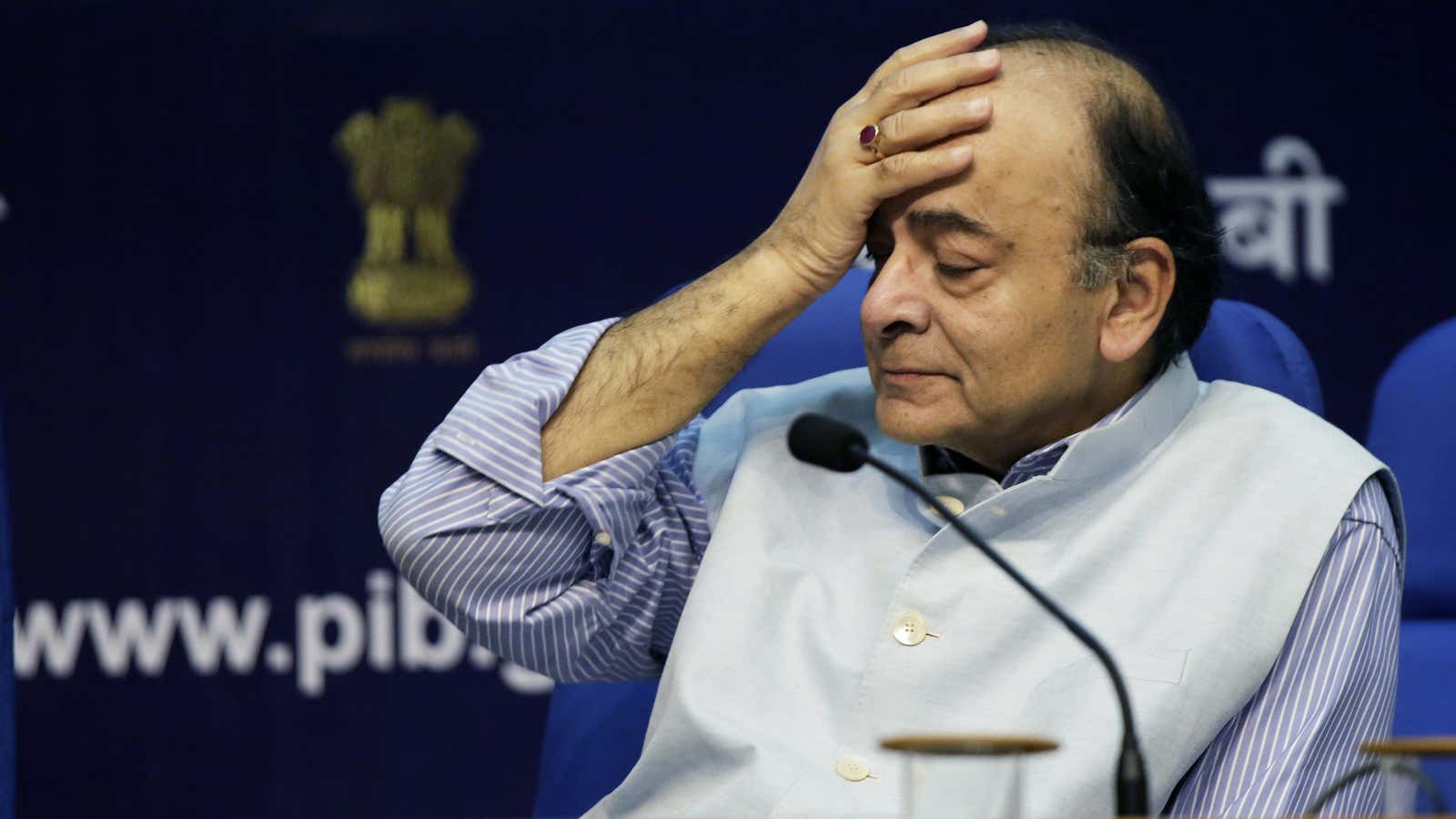You damn right, I’ve got the blues
From my head down to my shoes
You damn right, I’ve got the blues
From my head down to my shoes.
That was Buddy Guy in 1991.
In 2018, it could very well be India’s finance minister Arun Jaitley as he prepares to deliver the Narendra Modi government’s final full budget.
What are Jaitley’s blues?
It’s a long list but the headline points are: the need to attract investment, boost employment, encourage exports, and support the rural sector.
From rescuing farmers in distress to offering incentives for small businesses dented by the goods and services tax, the government is saddled with the weight of its promises. India also needs new roads, bridges, rail safety and connectivity, more power supply, better ports, and a lot more jobs than there are right now.
So, Jaitley may feel generous on morning of Feb. 01. And if his boss, prime minister Modi, demands a dazzling display of vote-seeking benevolence, then the populist possibilities are endless. The government will have to make a big enough splash that the voter will remember for another 15 months when the next general elections will be held.
Though economic prudence may be the need of the hour, political wisdom may trump it. In other words, Jaitley is walking the fiscal tightrope, carrying the massive burden of expectations—not something for the fainthearted.
As The Rolling Stones put it pithily in their 1965 song:
I can’t get no satisfaction,
I can’t get no satisfaction
‘Cause I try and I try and I try and I try
I can’t get no, I can’t get no…
Of course, the finance minister can borrow money on behalf of the government. He, and his predecessors, have been doing so with little hesitation. Prudence to the air and the credibility goes Rollin’ and tumblin’.
Well, if the river was whiskey,
And I was a diving duck.
Well, if the river was whiskey,
And I was a diving duck.
Well, I would dive to the bottom,
Never would I come up.
But Jaitley’s deep dive into the “muddy waters” of debt will leave the economy caked in gunk. To understand why, let us analyse how the government borrows money.
It sells bonds (like a note of promise) for money, and at the time of repayment (with interest), the government takes back those bonds. But like most other governments of growing economies, India’s never had enough money to meet its expenses either. How does it then repay the loans? Answer: new loans via new bonds to repay the older ones.
Yes, all governments are like the drunk, unemployed family acquaintance who is perpetually in debt. Pride is evanescent, as this Bob Dylan song from 1965 reminds us.
You used to laugh about
Everybody that was hanging out
Now you don’t talk so loud
Now you don’t seem so proud
…
How does it feel, how does it feel?
It is, however, acceptable for governments to behave “like a rolling stone” because, unlike the alcoholic family friend, there are more reasons to hope that it will successfully clear all its debt. So, usually no one refuses it.
But if it seems like the country is playing fast and loose with borrowed money, the loans get more expensive. For example, the promise to repay, i.e., bonds, lost sheen when the government took it on itself to clear farmers’ debts. The move may spring from its love for farmers (and votes), but lenders would pick up on that 1986 Bon Jovi number:
Shot through the heart
And you’re to blame
Darlin’, you give love a bad name
Yet, when bonds weaken, so does the currency. And that leads to more expensive imports, because we have to pay in dollars. Consider oil, for instance, which India imports for nearly 80% of its needs. The commodity will cost more and that bill will be passed on to the consumer. The result: inflation.
And when the government doles out a loan waiver or builds grand statues, it’s not just taxpayers who bear the cost. Eventually, every citizen will. As this track by The Beatles goes, there is no such thing as a free lunch.
I look at the world and I notice it’s turning
While my guitar gently weeps
With every mistake we must surely be learning
Still my guitar gently weeps
This is just one way that fiscal indiscipline will return to bite us. It also leads to higher interest rates, fewer private investments, and even fewer jobs. Essentially, any government largess is, more often than not, taken away by the chain reaction it triggers in other parts of the economy.
A few days ago, a retired “rockstar” from Mumbai’s Mint Street, home to India’s central bank, offered a piece of advice to Jaitley. When asked at Davos about the upcoming budget, former Reserve Bank of India governor Raghuram Rajan said: “I hope India sticks to macro stability and does not blow up the fiscal deficit to an extent that the country starts looking unreliable.” In laymen terms, do not promise to spend a lot more money than you are likely to make.
Unless, of course, Jaitley doesn’t mind being haunted by that Ray Charles number:
You promised me love
That would never die
That promise you’ve made
Was only a lie
We welcome your comments at ideas.india@qz.com.
